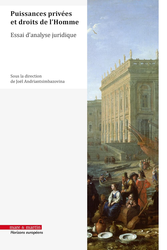Publications

🌐follow Marie-Anne Frison-Roche on LinkedIn
🌐subscribe to the Newsletter MAFR Regulation, Compliance, Law
____
► Full Reference: M.-A. Frison-Roche, "Concevoir l'Obligation de Compliance : faire usage de sa position pour participer à la réalisation des Buts Monumentaux de la Compliance" ("Conceiving the Compliance Obligation: Using its Position to take part in achieving the Compliance Monumental Goals"), in M.-A. Frison-Roche (ed.), L'Obligation de Compliance, Journal of Regulation & Compliance (JoRC) and Dalloz, "Régulations & Compliance" Serie, 2024, to be published
____
📝read the article (in French)
____
🚧read the bilingual Working Paper on the basis this contribution has been built, with more developments, technical references and hyperlinks.
____
📕read a general presentation of the book, L'Obligation de Compliance, in which this article is published
____
► English summary of this contribution: Rather than getting bogged down in definitional disputes, given that Compliance Law is itself a incipient branch of Law, the idea of this contribution is to take as a starting point the different regimes of so many different compliance obligations to which laws and regulations subject large companies: sometimes they must apply them to the letter and sometimes they are only penalised in the event of fault or negligence. This brings us back to the distinction between obligations of result and obligations of means.
Although it might be risky to transpose the expression and regime of contractual obligations to legal obligations, starting from this observation in the Compliance Evidentiary System of a plurality of obligations of means and of result, depending on whether we are dealing with this or that technical compliance obligation, we must first classify them. It would appear that this plurality does not constitute a definitive obstacle to the creation of a single definition of the Compliance Obligation. On the contrary, it makes it possible to clarify the situation, to trace the paths through what is so often described as a legal jumble, an unmanageable mass of regulations.
Indeed, insofar as the company obliged under Compliance Law participates in the achievement of the Monumental Goals on which this branch of Law is normatively based, a legal obligation which may be relayed by contract or even by ethics, it can only be an obligation of means, by virtue of this very teleological nature and the scale of the goals targeted, for example the happy outcome of the climate crisis which is beginning or the desired effective equality between human beings. This established principle leaves room for the fact that the behaviour required is marked out by processes put in place by structured tools, most often legally described, for example the establishment of a vigilance plan or regularly organised training courses (effectiveness), are obligations of result, while the positive effects produced by this plan or these training courses (efficacy) are obligations of means. This is even more the case when the aim is to transform the system as a whole, i.e. to ensure that the system is solidly based, that there is a culture of equality, and that everyone respects everyone else - all of which come under the heading of efficiency.
The Compliance Obligation thus appears unified because, gradually, and whatever the various compliance obligations in question, their intensity or their sector, its structural process prerequisites are first and foremost structures to be established which the Law, through the Judge in particular, will require to be put in place but will not require anything more, whereas striving towards the achievement of the aforementioned Monumental Goals will be an obligation of means, which may seem lighter, but corresponds to an immeasurable ambition, linked with these Goals. Moreover, because these structures (warning platforms, training, audits, contracts and clauses, etc.) only have meaning in order to produce effects and behaviour leading to changes converging towards the Monumental Goals, it is the obligations of means that are most important and not the obligations of result. The judge must also take this into account.
Finally, the Compliance Obligation, which therefore consists of this interweaving of multiple compliance obligations of result and means of using the Entreprise's position, ultimately aims at system efficiency, in Europe at system civilisation, for which companies must show not so much that they have followed the processes correctly (result) but that this has produced effects that converge with the Goals sought by the legislator (effects produced according to a credible trajectory). This is how a crucial economic operator, responsible Ex Ante, should organise itself and behave.
________
Thesaurus : Doctrine

► Référence complète : M. M. Mohamed Salah, "Conclusions", in J. Andriantsimbazovina (dir.), Puissances privées et droits de l'Homme. Essai d'analyse juridique, Mare Martin, coll. "Horizons européens", 2024, pp. 297-314
____
► Résumé de l'article :
____
🦉Cet article est accessible en texte intégral pour les personnes inscrites aux enseignements de la Professeure Marie-Anne Frison-Roche
________
Publications

🌐follow Marie-Anne Frison-Roche on LinkedIn
🌐subscribe to the Newsletter MAFR Regulation, Compliance, Law
____
► Full Reference: M.-A. Frison-Roche, "Conceiving the Compliance Obligation: Using its Position to take part in achieving the Compliance Monumental Goals", in M.-A. Frison-Roche (ed.), Compliance Obligation, Journal of Regulation & Compliance (JoRC) and Bruylant, "Compliance & Regulation" Serie, to be published
____
📝read the article
____
🚧read the bilingual Working Paper which is the basis of this article, with additional developments, technical references and hyperlinks
____
📘read a general presentation of the book, Compliance Obligation, in which this article is published
____
► Summary of the article (done by the Journal of Regulation & Compliance - JoRC):
________
Publications

🌐follow Marie-Anne Frison-Roche on LinkedIn
🌐subscribe to the Newsletter MAFR Regulation, Compliance, Law
____
► Full Reference: M.-A. Frison-Roche, "Compliance Obligation, between Will and Consent: obligation upon obligation works", in M.-A. Frison-Roche (ed.), Compliance Obligation, Journal of Regulation & Compliance (JoRC) and Bruylant, "Compliance & Regulation" Serie, to be published
____
📝read the article
____
🚧read the bilingual Working Paper which is the basis of this article, with additional developments, technical references and hyperlinks
____
📘read a general presentation of the book, Compliance Obligation, in which this article is published
____
► Summary of the article (done by the Journal of Regulation & Compliance - JoRC): There is often a dispute over the pertinent definition of Compliance Law, but the scale and force of the resulting obligation for the companies subject to it is clear. It remains difficult to define. First, we must not to be overwhelmed by the many obligations through which the Compliance Obligation takes shape, such as the obligation to map, to investigate, to be vigilant, to sanction, to educate, to collaborate, and so on. Not only this obligations list is very long, it is also open-ended, with companies themselves and judges adding to it as and when companies, sectors and cases require.
Nor should we be led astray by the distance that can be drawn between the contours of this Compliance Obligation, which can be as much a matter of will, a generous feeling for a close or distant other in space or time, or the result of a calculation. This plurality does not pose a problem if we do not concentrate all our efforts on distinguishing these secondary obligations from one another but on measuring what they are the implementation of, this Compliance Obligation which ensures that entities, companies, stakeholders and public authorities, contribute to achieving the Goals targeted by Compliance Law, Monumental Goals which give unity to the Compliance Obligation. Thus unified by the same spirit, the implementation of all these secondary obligations, which seem at once disparate, innumerable and often mechanical, find unity in their regime and the way in which Regulators and Judges must control, sanction and extend them, since the Compliance Obligation breathes a common spirit into them.
In the same way that the multiplicity of compliance techniques must not mask the uniqueness of the Compliance Obligation, the multiplicity of sources must not produce a similar screen. Indeed, the Legislator has often issued a prescription, an order with which companies must comply, Compliance then often being perceived as required obedience. But the company itself expresses a will that is autonomous from that of the Legislator, the vocabulary of self-regulation and/or ethics being used in this perspective, because it affirms that it devotes forces to taking into consideration the situation of others when it would not be compelled to do so, but that it does so nonetheless because it cares about them. However, the management of reputational risks and the value of bonds of trust, or a suspicious reading of managerial choices, lead us to say that all this is merely a calculation.
Thus, the first part of the contribution sets out to identify the Compliance Obligation by recognising the role of all these different sources. The second part emphasises that, in monitoring the proper performance of technical compliance obligations by Managers, Regulators and Judges, insofar as they implement the Compliance Obligation, it is pointless to limit oneself to a single source or to rank them abruptly in order of importance. The Compliance Obligation is part of the very definition of Compliance Law, built on the political ambition to achieve these Monumental Goals of preserving systems - banking, financial, energy, digital, etc. - in the future, so that human beings who cannot but depend on them are not crushed by them, or even benefit from them. This is the teleological yardstick by which the Compliance Obligation is measured, and with it all the secondary obligations that give it concrete form, whatever their source and whatever the reason why the initial standard was adopted.
________
Jan. 7, 2025
Publications

► Référence complète : M.A. Frison-Roche, préface à l'ouvrage de Y. Oubejja,, La puissance économique en droit de la concurrence, L'Harmattan Éditions, coll. "Logiques juridiques", 2025, pp.13-16
____
📝Lire la préface
____
► Présentation de la préface : une préface pouvant prendre plus de champ que ne le prend un ouvrage technique qui traite le thème de la puissance dans le cadre du Droit de la concurrence, la préface aborde le rapport entre le Droit et la puissance, qu'il s'agisse du fait de la puissance ou de la puissance du Droit, rapport dont l'examen remplit les bibliothèques et passionne les philosophes, les politistes et les sociologues.
Dans le Droit de la concurrence, construit sur la Liberté, qu'il s'agit du droit civil de la concurrence ou du droit système des marchés concurrentiel, la puissance est le levier mais devient l'objet du Droit, lorsque, jouxtant la Régulation la puissance devient un objet autonome d'intervention, soit que le passage vers l'Ex Ante se passe à l'occasion, celle d'une concentration, soit du fait d'une situation structurelle, celle d'un secteur. Le Droit des pratiques restrictives prend le gant de la puissance en le retournant par son revers qu'est la dépendance. Des remèdes à ce désir humain de dominer, il y a peu. L'information et la transparence en Ex Ante. Des sanctions, toujours des sanctions, en Ex Post. Des textes, toujours des textes.
________

Dec. 20, 2024
MAFR TV : MAFR TV - Overhang

🌐suivre Marie-Anne Frison-Roche sur LinkedIn
🌐s'abonner à la Newsletter MAFR. Regulation, Compliance, Law
🌐s'abonner à la Newsletter Surplomb, par MAFR
____
► Référence complète : M.-A. Frison-Roche, "Les contours géographiques de la Compliance", in série de vidéos Surplomb, 20 décembre 2024
____
🌐visionner sur LinkedIn cette vidéo de la série Surplomb
____
____
🎬visionner ci-dessous cette vidéo de la série Surplomb⤵️
____
Surplomp, par mafr
la série de vidéos dédiée à la Régulation, la Compliance et la Vigilance


May 6, 2024
Newsletter MAFR - Law, Compliance, Regulation

🌐follow Marie-Anne Frison-Roche on LinkedIn
🌐subscribe to the Newsletter MAFR Regulation, Compliance, Law
____
► Full Reference: M.-A. Frison-Roche, "Pourquoi approuver les "puissances privées"? Pour mieux servir les droits humains grâce au Droit de la Compliance (Why endorse “private powers”? To better serve human rights through Compliance Law)", Newsletter MAFR Law, Compliance, Regulation, May 6, 2024
____
📧Read by freely subscribing other news of the Newsletter MAFR - Law, Compliance, Regulation
____
🧱Compliance, especially Vigilance, needs power: that's why large companies are subject to it
In the book edited by J.Andriantsimbazovina, 📗Puissances privées et droits de l'Homme. Essai d'analyse juridique (Private powers and human rights. A legal analysis), the perspective is quite often to oppose the public power of the State, legitimate and virtuous, and private powers, selfish and harmful.
Without discussing this cosmogony, the Law of Compliance is in any case based on the idea that this branch of Law aims to preserve systems of risk, by making them sustainable and habitable by human beings: for these Monumental Goals to be attainable, it is necessary to target subjects of Law who have the power required to develop the necessary efforts. These are the “private powers” on which we rely today, both de facto and de jure, particularly if we are concerned about distant others in space and time.
This is not to say that these private powers exclude public power, since on the one hand it is Politics and Public Authorities who set the content of Monumental Goals, and on the other hand these authorities who supervise companies. The latter, however, choose the most appropriate means of fulfilling this duty, and are accountable for this obligation of means.
____
📧read the article published on 6 May 2024 on this topic in the Newsletter MAFR - Law, Compliance, Regulation ⤵️
April 18, 2024
Thesaurus : Doctrine

► Référence complète : J. Andriantsimbazovina (dir.), Puissances privées et droits de l'Homme. Essai d'analyse juridique, Mare Martin, coll. "Horizons européens", 2024, 324 p.
____
____
📗lire le sommaire de l'ouvrage
____
📗lire la table des matières de l'ouvrage
____
► Résumé de l'ouvrage (fait par l'éditeur) : "Dans de nombreux secteurs de la société, tant au niveau international qu'au niveau national, la puissance publique est concurrencée voire dépassée par les puissances privées. Les différentes crises qui traversent la planète, des conflits armés à la pandémie en passant par la crise financière, ont mis en évidence le poids des puissances privées dans la vie en société. Ce poids pèse lourd y compris en matière de droits de l'homme. Ces derniers sont classiquement l'apanage de la puissance publique tant concernant leur consécration que concernant leur protection. Or, il apparaît qu'ils sont affectés par les puissances privées. Autant sous l'angle économique, sous l'angle politique que sous l'angle sociologique, ce phénomène est assez aisé à appréhender, autant sous l'angle juridique il est très difficile à saisir. Le présent ouvrage constitue un essai expérimental à la fois de définition juridique des puissances privées, de mesure de leur rôle en matière d'atteinte et de protection des droits de l'homme. Il aborde leur encadrement au nom des droits de l'homme à un triple niveau (international, supranational et national) et sous l'angle de nouvelles disciplines juridiques émergentes comme le droit de la compliance.".
____
📝lire une présentation de l'article de Marie-Anne Frison-Roche : "L’usage des puissances privées par le droit de la compliance pour servir les droits de l’homme"
____
📝lire une présentation de l'article de Mohamed Mahmoud Mohamed Salah : "Conclusions"
________
April 18, 2024
Publications

🌐follow Marie-Anne Frison-Roche on LinkedIn
🌐subscribe to the Newsletter MAFR Regulation, Compliance, Law
🌐subscribe to the Video Newsletter MAFR Surplomb
____
► Full reference: M.-A. Frison-Roche, "L’usage des puissances privées par le droit de la compliance pour servir les droits de l’homme" (Use of private companies by Compliance Law to serve Human Rights) , in J. Andriantsimbazovina (dir.), Puissances privées et droits de l'Homme. Essai d'analyse juridique, Mare Martin, coll. "Horizons européens", 2024, pp. 279-295
____
🚧read the Bilingual Working Paper on which this article is based, with more technical developments, references and hypertext links
____
► English Summary of this article: Following the legal tradition, Law creates a link between power with a legitimate source, the State, public power being its prerogative, while private companies exercise their power only in the shadow of this public power exercised ex ante. The triviality of Economic Law, of which Competition Law is at the heart, consisting of the activity of companies that use their power on markets, relegates the action of the State to the rank of an exception, admissible if the State, which claims to exercise this contrary power, justifies it. The distribution of roles is thus reversed, in that the places are exchanged, but the model of opposition is shared. This model of opposition exhausts the forces of the organisations, which are relegated to being the exception. However, if we want to achieve great ambitions, for example to give concrete reality to human rights beyond the legal system within which the public authorities exercise their normative powers, we must rely on a new branch of Law, remarkable for its pragmatism and the scope of the ambitions, including humanist ambitions, that it embodies: Compliance Law.
Compliance Law is thus the branch of Law which makes the concern for others, concretised by human rights, borne by the entities in a position to satisfy it, that is to say the systemic entities, of which the large companies are the direct subjects of law (I). The result is a new division between Public Authorities, legitimate to formulate the Monumental Goal of protecting human beings, and private organisations, which adjust to this according to the type of human rights and the means put in place to preserve them. Corporations are sought after because they are powerful, in that they are in a position to make human rights a reality, in their indifference to territory, in the centralisation of Information, technologies and economic, human, and financial means. This alliance is essential to ensure that the system does not lead to a transfer of political choices from Public Authorities to private companies; this alliance leads to systemic efficiency. The result is a new definition of sovereignty as we see it taking shape in the digital space, which is not a particular sector since it is the world that has been digitalised, the climate issue justifying the same new distribution of roles (II).
____
📝read the article (in French)
________

Jan. 22, 2024
Hearings by a Committee or Public organisation

🌐suivre Marie-Anne Frison-Roche sur LinkedIn
🌐s'abonner à la Newsletter MAFR Regulation, Compliance, Law
____
► Référence complète : M.-A. Frison-Roche, audition notamment par Maître Sophie Bonne et Maître Anne-Claire Ancelin, respectivement présidente et rapporteure de la Commission du Conseil Supérieur du Notariat (CSN), élaborant un rapport sur Compliance : un espace à conquérir ?, 22 janvier 2024, CSN, Paris..
____
► Résumé de la présentation : j'ai eu l'occasion d'étudier et de discuter des relations entre le notaire comme professionnel et le notariat comme structure de régulation d'une part et le Droit de la Compliance, d'autre part.
Je l'ai fait lors des travaux du Conseil Supérieur du Notariat sur la raison d'être, dans une audition avec la Commission du CSN en charge de la réflexion à ce propos et et d'une façon plus générale à propos de l'articulation entre l'office du notariat et les mécanismes juridiques de régulation, car le Droit de la Compliance est le prolongement du Droit de la Régulation. J'ai d'ailleurs à ce titre fait une masterclass sur le droit de la compliance lors du Congrès annuel de 2022 à ce sujet.
M'appuyant sur ces premières réflexions et discussions, je peux articuler les propos suivants:
0. Observation préalable : l'intitulé semble sous-entendre que la compliance serait un espace nouveau, où le notariat serait étranger et qu'il faudrait "conquérir" cette terra incognita , le point d'interrogation permettant de suggérer que, si nouveau soit le Droit de la Compliance, c'est plutôt dans les professions agissant en Ex Ante qu'il est le moins "étranger" et que l'espace est donc déjà le plus "naturel".
L'enjeu est plutôt dans l'ambition que l'on peut en avoir : soit une ambition faible ("conformité"), soit une ambition forte ("Droit de la Compliance").
1. Un espace restreint aujourd'hui et plus encore demain si l'on réduit la Compliance à ce qui n'est que son outil : la conformité. Cette réduction équivaut à un grand dommage, car les algorithmes sont aptes à prendre en charge la conformité, et font le faire le plus en plus, tandis que la compliance est maniée par les êtres humains. La conformité est, mais n'est que, un outil de la Compliance.
2. La Compliance se définit par les Buts Monumentaux
- Les Buts monumentaux sont fixés par les Autorités politiques et publiques et ne peuvent être fixés que par elles ; le déploiement des moyens peuvent être déploient par d'autres que l'administration
3. Pragmatiquement, les buts monumentaux unifient la "masse réglementaire"
4. Tendre, dans une trajectoire, vers eux nécessite des êtres humains qui se coordonnent et agissent ensemble (ensemble du modèle concurrentiel)
5. Ils constituent la Compliance comme une branche ex ante du Droit
6. Ils placent le Droit de la Compliance en déploiement du Droit de la Régulation
7. Le Notariat est alors tout d'abord un "agent d'effectivité de la conformité", se dotant pour cela notamment des outils algorithmiques
8. Le Notariat est aussi une profession humaniste qui aide l'Etat, les entreprises et les parties intéressées à tendre vers la protection des êtres humains, pour qu'ils ne soient pas broyés par les systèmes devenus plus menaçants (but monumental négatif) et qu'ils en bénéficient (but monumental positif)
9. En cela, le Notariat, comme le Juge et l'Avocat, doit être consolidé dans sa structure, et doit aussi se présenter, au niveau du professionnel, au niveau de l'étude, au niveau de la profession structurée
10. Le Notariat doit aussi conforter sa gouvernance dans ce nouveau système de Compliance qui est en lien avec l'Etat de Droit et la Démocratie.
____
► Voir dans mes travaux ceux qui peuvent présenter un intérêt au regard de cette audition ⤵️
🕴️M.-A. Frison-Roche, 🖥️Appliquer la notion de "Raison d'être à la profession du Notariat, 2021
🕴️M.-A. Frison-Roche,🎤La compliance pour les études notariales : aspects théoriques et pratiques, Congrès des notaires , 2022
🕴️M.-A. Frison-Roche,📝Notariat et régulation font bon ménage, 2015
🕴️M.-A. Frison-Roche, 💬La profession investit le Droit de la Compliance et détermine sa Raison d'Etre, 2023
🕴️M.-A. Frison-Roche (dir.), 📕Les Buts Monumentaux de la Compliance, 2022
🕴️M.-A. Frison-Roche, 📝Penser et manier la Vigilance par ses Buts Monumentaux de Compliance, mars 2023.
🕴️M.-A. Frison-Roche, 📝Contrat de compliance, clauses de compliance, 2022.
🕴️M.-A. Frison-Roche, 🚧L'invention de la vigilance : un terme nouveau pour une Responsabilité en Ex Ante, 2021.
🕴️M.-A. Frison-Roche, 📝Synthèse : Le rôle du juge dans le déploiement du droit de la régulation par le droit de la compliance, à paraître
🕴️M.-A. Frison-Roche, 📝Le Droit de la compliance, 2016.
________

May 4, 2023
Publications

🌐 follow Marie-Anne Frison-Roche on LinkedIn
🌐 subscribe to the Newsletter MAFR Regulation, Compliance, Law
____
► Full reference: M.-A. Frison-Roche, Use of private companies by Compliance Law to serve Human Rights, Working Paper, May 2023.
____
This Working Paper is the basis of:
🎤a conference done in French in Toulouse on June 16, 2023
____
►Summary of this Working Paper: Following the legal tradition, Law creates a link between power with a legitimate source, the State, public power being its prerogative, while private companies exercise their power only in the shadow of this public power exercised ex ante. The triviality of Economic Law, of which Competition Law is at the heart, consisting of the activity of companies that use their power on markets, relegates the action of the State to the rank of an exception, admissible if the State, which claims to exercise this contrary power, justifies it. The distribution of roles is thus reversed, in that the places are exchanged, but the model of opposition is shared. This model of opposition exhausts the forces of the organisations, which are relegated to being the exception. However, if we want to achieve great ambitions, for example to give concrete reality to human rights beyond the legal system within which the public authorities exercise their normative powers, we must rely on a new branch of Law, remarkable for its pragmatism and the scope of the ambitions, including humanist ambitions, that it embodies: Compliance Law.
Compliance Law is thus the branch of Law which makes the concern for others, concretised by human rights, borne by the entities in a position to satisfy it, that is to say the systemic entities, of which the large companies are the direct subjects of law (I). The result is a new division between Public Authorities, legitimate to formulate the Monumental Goal of protecting human beings, and private organisations, which adjust to this according to the type of human rights and the means put in place to preserve them. Corporations are sought after because they are powerful, in that they are in a position to make human rights a reality, in their indifference to territory, in the centralisation of Information, technologies and economic, human, and financial means. This alliance is essential to ensure that the system does not lead to a transfer of political choices from Public Authorities to private companies; this alliance leads to systemic efficiency. The result is a new definition of sovereignty as we see it taking shape in the digital space, which is not a particular sector since it is the world that has been digitalised, the climate issue justifying the same new distribution of roles (II).
________
🔓read the full developments below⤵️
March 9, 2016
Teachings : Banking and Financial Regulatory Law, 2016
Oct. 21, 2015
Thesaurus : Doctrine
Référence : Rochfeld, J., Les géant de l'internet et l'appropriation des données personnelles : plaidoyer contre la reconnaissance de leur "propriété", in Behar-Touchais, M. (dir.), L'effectivité du droit face à la puissance des géants de l'Internet, coll. "Bibliothèque de l'IRJS - André Tunc", vol.1, IRJS Éditions, Université Panthéon-Sorbonne, p.73-87.
L'auteur se demande si les "géants d'Internet" peuvent s'approprier les données.
Aug. 5, 2015
Thesaurus : 01. Conseil constitutionnel
Extrait de la décision :
"le 2° de l'article 39 est relatif à la création d'une procédure d'injonction structurelle dans le secteur du commerce de détail en France métropolitaine ;
28. Considérant que le 2° de l'article 39 donne une nouvelle rédaction de l'article L. 752-26 du code de commerce pour permettre à l'Autorité de la concurrence de prononcer, sous certaines conditions, en France métropolitaine, des injonctions structurelles imposant la modification des accords ou la cession d'actifs d'une entreprise ou d'un groupe d'entreprises, en cas d'existence d'une position dominante et de détention d'une part de marché supérieure à 50 % par cette entreprise ou ce groupe d'entreprises exploitant un ou plusieurs magasins de commerce de détail ; que l'Autorité de la concurrence peut enjoindre à l'entreprise ou au groupe d'entreprises en cause de modifier, de compléter ou de résilier, dans un délai déterminé qui ne peut excéder six mois, tous accords et tous actes par lesquels s'est constituée la puissance économique qui se traduit par des prix ou des marges élevés ; qu'elle peut, dans les mêmes conditions, lui enjoindre de procéder, dans un délai qui ne peut être inférieur à six mois, à la cession d'actifs, y compris de terrains, bâtis ou non ;
29. Considérant que les députés et sénateurs requérants soutiennent que l'article L. 752-26, tel que modifié par l'article 39, méconnaît le droit de propriété, dès lors que la cession forcée d'actifs ou la résiliation forcée de conventions en cours dans un délai déterminé ne peuvent se réaliser que dans des conditions défavorables pour l'entreprise ; que, selon eux, il résulte de cet article une atteinte à la liberté d'entreprendre qui n'est pas justifiée par une situation particulière de la concurrence en France métropolitaine ; qu'ils font également reproche à la loi de porter atteinte au droit au maintien des conventions légalement conclues ; qu'enfin, les députés requérants font grief à l'article L. 752-26 de méconnaître le principe de légalité des délits et des peines ainsi que l'objectif d'accessibilité et d'intelligibilité de la loi ;
30. Considérant que la propriété figure au nombre des droits de l'homme consacrés par les articles 2 et 17 de la Déclaration de 1789 ; qu'aux termes de son article 17 : « La propriété étant un droit inviolable et sacré, nul ne peut en être privé, si ce n'est lorsque la nécessité publique, légalement constatée, l'exige évidemment, et sous la condition d'une juste et préalable indemnité » ; qu'en l'absence de privation du droit de propriété au sens de cet article, il résulte néanmoins de l'article 2 de la Déclaration de 1789 que les atteintes portées à ce droit doivent être justifiées par un motif d'intérêt général et proportionnées à l'objectif poursuivi ;
31. Considérant qu'il est loisible au législateur d'apporter à la liberté d'entreprendre qui découle de l'article 4 de la Déclaration de 1789 des limitations liées à des exigences constitutionnelles ou justifiées par l'intérêt général, à la condition qu'il n'en résulte pas d'atteintes disproportionnées au regard de l'objectif poursuivi ;
32. Considérant qu'en adoptant le 2° de l'article 39, le législateur a entendu corriger ou mettre fin aux accords et actes par lesquels s'est, dans le commerce de détail, constituée une situation de puissance économique portant atteinte à une concurrence effective dans une zone considérée se traduisant par des pratiques de prix ou de marges élevés en comparaison des moyennes habituellement constatées dans le secteur économique concerné ; qu'il a ainsi poursuivi un objectif de préservation de l'ordre public économique et de protection des consommateurs ; que, toutefois, d'une part, les dispositions contestées peuvent conduire à la remise en cause des prix ou des marges pratiqués par l'entreprise ou le groupe d'entreprises et, le cas échéant, à l'obligation de modifier, compléter ou résilier des accords ou actes, ou de céder des actifs alors même que la position dominante de l'entreprise ou du groupe d'entreprises a pu être acquise par les mérites et qu'aucun abus n'a été constaté ; que, d'autre part, les dispositions contestées s'appliquent sur l'ensemble du territoire de la France métropolitaine et à l'ensemble du secteur du commerce de détail, alors même qu'il ressort des travaux préparatoires que l'objectif du législateur était de remédier à des situations particulières dans le seul secteur du commerce de détail alimentaire ; qu'ainsi, eu égard aux contraintes que ces dispositions font peser sur les entreprises concernées et à leur champ d'application, les dispositions de l'article L. 752-26 du code de commerce portent tant à la liberté d'entreprendre qu'au droit de propriété une atteinte manifestement disproportionnée au regard du but poursuivi ; que, par suite et sans qu'il soit besoin d'examiner les autres griefs, le 2° de l'article 39 est contraire à la Constitution ; qu'il en va de même du 1° de ce même article, qui en est inséparable ;
Oct. 14, 2014
Teachings : Grandes Questions du Droit, Semestre d'Automne 2014
 La responsabilité est un thème philosophique majeur, qui fonde les sociétés et les personnes. Les personnes irresponsables sont-elles encore des personnes ? Si les animaux accédaient à la personnalité, il faudrait les déclarer aptes à la responsabilité. Classiquement, une personne est responsable parce qu'elle est coupable, conception avant tout religieuse de la responsabilité, qui met au centre la notion de faute. Plus pragmatiquement, c'est aujourd'hui l'engagement qui noue l'obligation de répondre, par exemple l'engagement contractuel d'un assureur. La responsabilité n'est plus alors individuelle mais collective et renvoie à un marché de la responsabilité ou à une prise en charge collective par les pouvoirs publics. Dans une description plus technique, une personne est responsable par sa faute, du fait d'une chose ou du fait d'une personne. Mais si les textes ont jusqu'ici peu bougé dans le Code civil, la jurisprudence a objectivisé le système, développant les deux dernières hypothèses, pour privilégier la fonction réparatrice des responsabilités, y compris pénales et administratives, même si la réparation est symbolique. Les conséquences de la responsabilité sont en effet très diverses. Il peut s'agir aussi bien du remord, qu'il est difficile de demander aux personnes morales mais qu'on exige de ses dirigeants, la punition pour laquelle le droit actuel développe une grande passion, tandis que la réparation devient un souci majeur et se transforme en prévention, dans une société du risque 0.
La responsabilité est un thème philosophique majeur, qui fonde les sociétés et les personnes. Les personnes irresponsables sont-elles encore des personnes ? Si les animaux accédaient à la personnalité, il faudrait les déclarer aptes à la responsabilité. Classiquement, une personne est responsable parce qu'elle est coupable, conception avant tout religieuse de la responsabilité, qui met au centre la notion de faute. Plus pragmatiquement, c'est aujourd'hui l'engagement qui noue l'obligation de répondre, par exemple l'engagement contractuel d'un assureur. La responsabilité n'est plus alors individuelle mais collective et renvoie à un marché de la responsabilité ou à une prise en charge collective par les pouvoirs publics. Dans une description plus technique, une personne est responsable par sa faute, du fait d'une chose ou du fait d'une personne. Mais si les textes ont jusqu'ici peu bougé dans le Code civil, la jurisprudence a objectivisé le système, développant les deux dernières hypothèses, pour privilégier la fonction réparatrice des responsabilités, y compris pénales et administratives, même si la réparation est symbolique. Les conséquences de la responsabilité sont en effet très diverses. Il peut s'agir aussi bien du remord, qu'il est difficile de demander aux personnes morales mais qu'on exige de ses dirigeants, la punition pour laquelle le droit actuel développe une grande passion, tandis que la réparation devient un souci majeur et se transforme en prévention, dans une société du risque 0.
Updated: July 31, 2013 (Initial publication: Sept. 6, 2011)
Teachings : Les Grandes Questions du Droit, semestre d'automne 2011

Updated: July 31, 2013 (Initial publication: Sept. 13, 2011)
Teachings : Les Grandes Questions du Droit, semestre d'automne 2011

Updated: July 31, 2013 (Initial publication: Nov. 8, 2011)
Teachings : Les Grandes Questions du Droit, semestre d'automne 2011

Updated: July 31, 2013 (Initial publication: Oct. 25, 2011)
Teachings : Les Grandes Questions du Droit, semestre d'automne 2011

